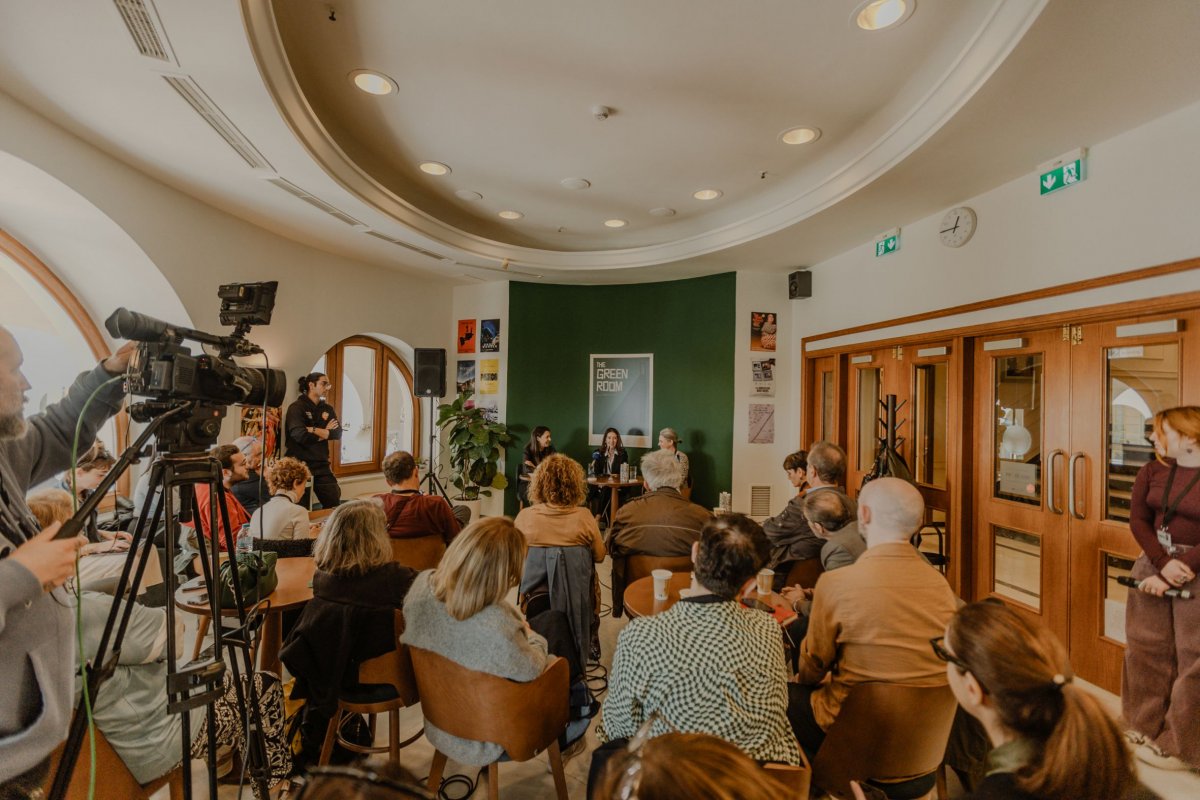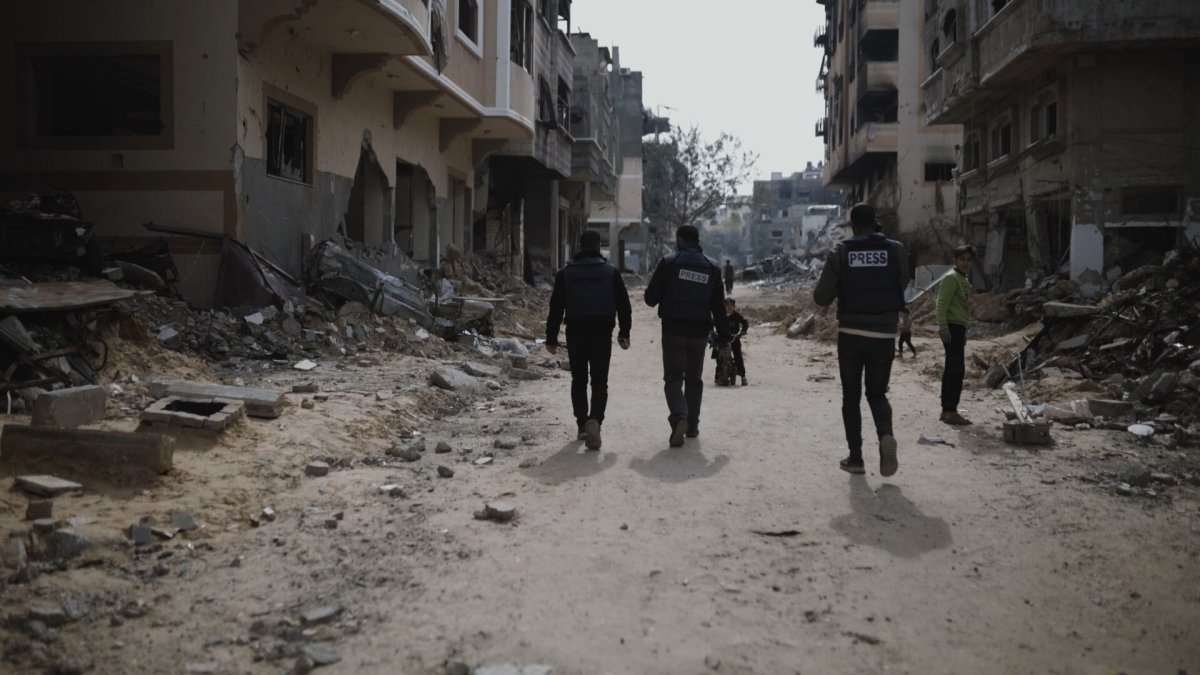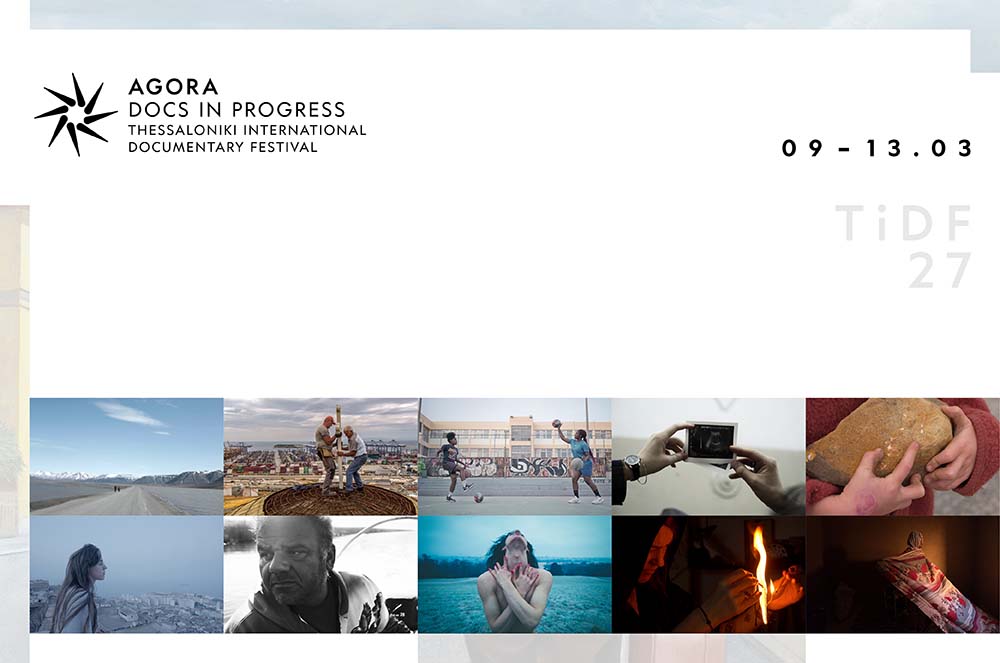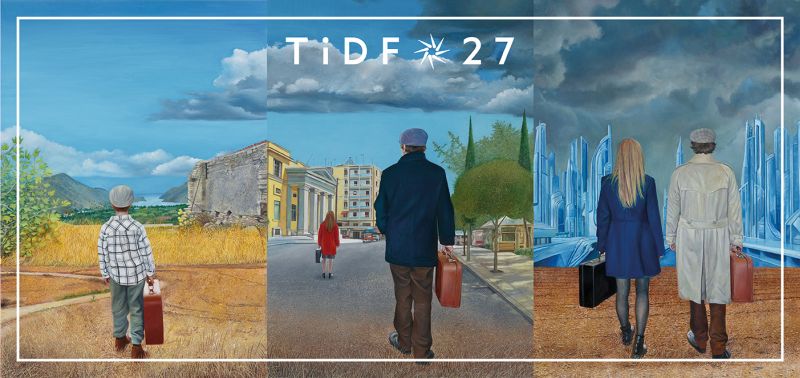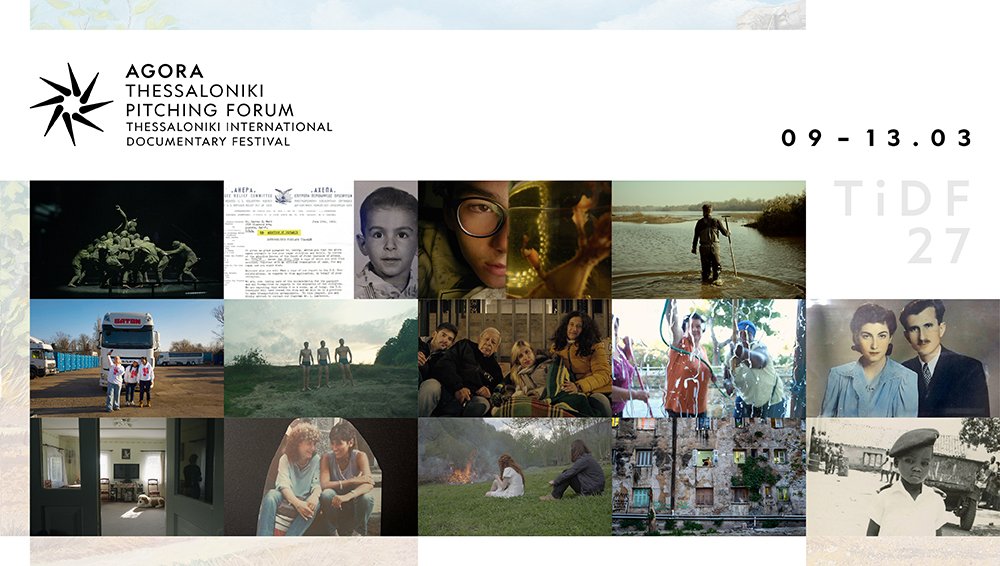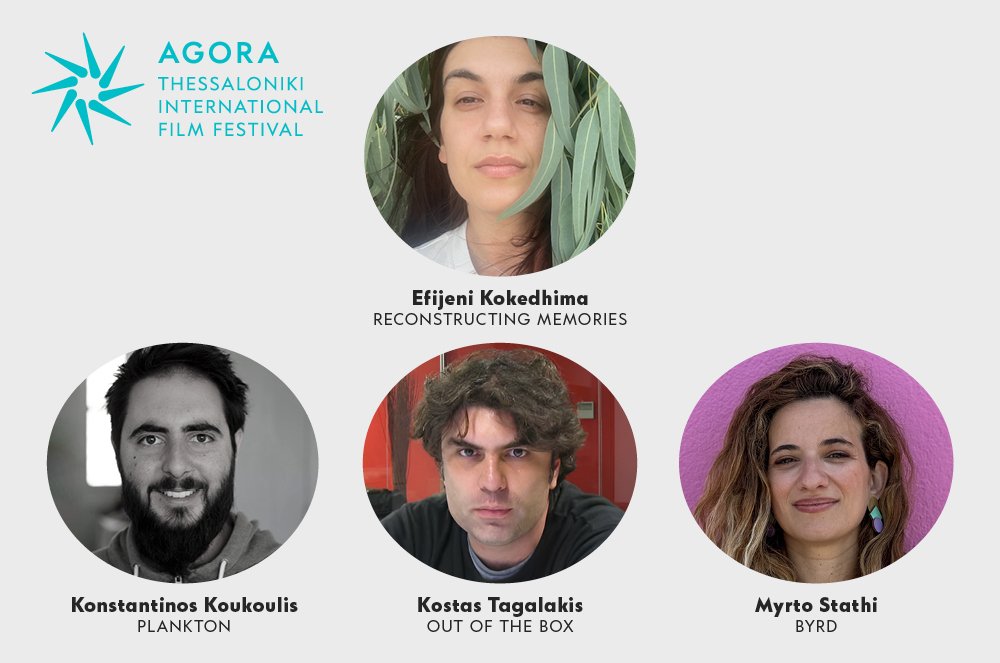On Wednesday November 6th, a discussion with bestselling author Victoria Hislop, the Agora ambassador of the 65th Thessaloniki International Film Festival, took place at the Green Room of the Olympion theater. The event was moderated by Dimitra Nikolopoulou, Head of the Press, Communication, Outreach & Sponsorships Office, with the aid of Angeliki Vergou, Head of the Agora. Initially, Dimitra Nikolopoulou took the floor, welcoming Victoria Hislop: “It’s a pleasure to be presenting Victoria as this year’s edition Agora ambassador. Especially here in Greece, Victoria Hislop is dearly beloved, and her ties to the activities of the Agora are very organic, as storytelling is at the heart of cinema. Victoria, we love you, the people love you, you know that. Today, we hope you give us more details about the secrets of your craft, but also about all that you have observed in the Festival up till now.”
Victoria Hislop thanked the attendees, referring first of all to her experience as the Agora ambassador: “I came here as a guest of the Agora with the aim of helping some of the younger filmmakers find inspiration and providing them with some encouragement. Of course, life never goes the way you expect seeing as ultimately, I was the one who stumbled upon exceptional sources of inspiration. I saw images on screen that often moved me, images shocking, uplifting, or amusing at times – all these different facets of filmmaking which are at the heart of the reason why audiences watch a film. Ι have been profoundly inspired by intercultural collaborations, an element that made me reflect on the rich versatile past of Thessaloniki, crafting in my head an ideal multicultural city populated by Orthodox, Muslim and Jewish people, living together in a very creative and harmonious manner. Arriving at the Festival, I considered how important these collaborations between different countries, beyond borders, are and how art can overcome conflicts in the most simple and straightforward way. Witnessing so many projects in this amazing program that may be the result of three, four, or even five countries working in tandem to create a film that will eventually be screened around the world, I feel that we are heading towards a correct and strong direction,” the renowned author initially stated.
“My own relationship with Thessaloniki is intense. I don’t know if this is the reason I was the recipient of this honorary invitation, but my third novel, The Thread, has Thessaloniki as its backdrop. I chose this title because I discerned a thread that had once traversed all these different cultures, a theme directly related to the Festival. There is an astounding thread that literally connects all these people who are here with a common purpose. All the younger people out there, people in their 20s and 30s, are the ones I’ll carry with me the most upon my return to London. The up-and-coming producers and filmmakers who were gathered here this week need your encouragement more than ever in order to keep creating and believe that their ideas can have some influence on the world. As Agora’s ambassador, I connected deeply with them, and was convinced that they are the tomorrow of the film industry. In a way, they have a lot to teach us. The people I got to know here are all open-minded, liberal, and confident – which is a wonderful aspect of the Agora for me,” Victoria Hislop added.
In response to a question posed by Dimitra Nikolopoulou on the importance of identity, especially as it pertains to young people and emerging creators, Victoria Hislop said: “I feel very close to Greece. I have a Greek nationality and I spend a lot of my time here, so I’ve had the opportunity to gain a profound insight into the meaning of the Greek identity. The Greek part of me is stronger now than the British one, which has begun to fade away inside of me. Personally speaking, I no longer identify with being British, and this is largely due to Brexit. We, the ones who wanted to remain European, suddenly found ourselves representing the minority. On that day, I felt Britain shrinking. Ever since I went to school, I felt I was European. I always wanted to learn languages wherever and whenever I had the chance. At school, we were taught German, French, and Spanish, and imagine it was nothing more than a simple public school. We were also taught Latin and Ancient Greek. As a result, Europe became my chosen place of residence. Identity for me, and hopefully for many other younger people, is associated with feeling European. As for the Greek identity, I would not like to see Greeks lose their sense of nationhood linking them together, but I’d rather they define themselves as a nation with borders that are gradually receding, allowing for other influences to permeate. To be honest, though, I think something akin to that is already occurring,” she said.
Immediately afterwards, touching upon the invitation from Agora, as well as the collaboration with Angeliki Vergou, Victoria Hislop remarked: “Angeliki was there from the very beginning, holding my hand. Angeliki and I met in Athens, when she explained in detail what the Agora comprises. I had heard many things about the Thessaloniki International Film Festival, and the word ‘International’ always has an appeal. However, for me, the Festival’s most important component is the Agora as it is a reflection of the future. This week, I have passed numerous times by the place where younger directors and scriptwriters are given the opportunity to sit at the same table with producers, who come to talk to them and aid them in taking the next step."
Next, Angeliki Vergou took the floor, speaking on the international character and orientation of the Agora. “Many times, we compare our job to a puzzle with the Agora team as a joke. When we receive the petitions, we go through the scripts, and watch excerpts from the films and for us, it is like a puzzle we must complete so as to include works form the entire region and all the genres we represent. We are also trying to secure different levels of funding to ensure that filmmakers have the help and support they need. Essentially, it’s like we are trying our hand at matchmaking. We assign a project to a filmmaker that we consider to be a good fit, and then we wait to see magic happen, or if the chemistry works,” she stated.
“It’s like a large-scale Tinder exercise,” Victoria Hislop humorously said, only to later add: “In reality, it is much more like speed dating, where the people just sit across one another at a table, understanding at once if they hear wedding bells ringing or not.” Then, Victoria Hislop highlighted the importance of the live interaction between the filmmakers offered by the Festival and the Agora: “After 2020, when we believed for a moment, we would be able to govern the world through a screen, I have no doubts anymore that face-to-face meetings reaffirm our human nature: you are only able to comprehend whether you can work with someone or not by staring them in the eye. Human interaction is an essential component for crafting films,” she explained.
Discussing the difference between the sense of identity between Greece and Great Britain, Victoria Hislop said: “In Great Britain, people don’t talk about their parents and grandparents right away, while here in Greece I have observed it is commonplace. For example, I have met so many people that told me ‘my grandmother was from Smyrna.’ The people in Greece have, I think, stories of travels and personal journeys that go back two or three generations compared to the ‘I’m British, I was born there’ reaction you will encounter in Great Britain.”
In a question as to what is scaring her today , Victoria Hislop divulged: “If you were to ask me yesterday, perhaps I would have given a different answer. But today, I am scared of the changes the Trump regime will bring about. I can’t pick another word other than ‘regime,’ as what happens in America usually makes its way first to the United Kingdom and then later on to the rest of Europe. I am scared both for the people’s way of thinking, and the effect it will have on a cultural level. For example, I am terrified for the women in America today, because a man with sexual assault charges has been elected. Therefore, as of November 6th, 2024, this is my answer. By the way, I’d also like to say that with regard to the Agora and the Festival in general, I’m very enthused by how many women have a key role in the industry.”
When asked if she plans to stay in Greece long-term, Victoria Hislop answered: “I feel blessed to have these two passports, a sentiment I experienced most profoundly in 2020, when all of us felt imprisoned in our homeland. I was scared that I could never leave Great Britain and then I thought – perhaps someone could shoot a film with this subject, either a utopian or a dystopian film – what it would be like to have a one-way ticket to some unknown destination. On my part, I’m certain I would choose to buy a one-way ticket to Greece. Sometimes, I think there are places in Greece that are closer to paradise than the people born and raised there might believe. Thessaloniki is a kind of paradise. A city by the sea, filled with students and young people, with a historical past. The amalgamation of these two elements is something extremely unique," she stated.
On the subject of the relationship between the purpose of making sales and the artists’ firm belief in their ideas, Victoria Hislop referred to one of the most successful books of her career, The Island as an example. “When I was writing it, I had the impression it wasn’t commercial, yet not putting it on paper was beyond me. This week, I saw and heard so many pitches for films that made me believe it was impossible for the aspiring filmmakers to never shoot the films in question. The Island was rejected by many publishers and agents in the beginning, who told me: ‘We like the love story, we like the Greek island setting, but can you take out the leprosy?’ It was a miracle that this book was published. And it only happened because it ended up on the desk of a young editor, whose father was a doctor for patients with leprosy in Africa. When there's little luck and a lot of conviction in your story, anything is possible. I have wished many people ‘good luck’ during this week, but I don't mean good luck in the abstract way that the stars or the universe will help. I am actually wishing you what the French call ‘bon courage’ - to have courage and strength. Luck has to do with how we take advantage of the opportunities we are given,” she concluded.


